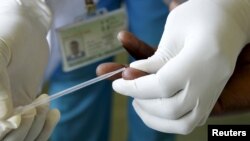Lord Datey, South Sudan's director of UNAIDS says the nation is lagging in its fight against HIV/ AIDS.
"Globally, of all people who are living with HIV, 67% have access to treatment. In South Sudan, it is only 18%," Datey told VOA.
"We need to rally everybody around and ensure that we are all addressing the issue," he said.
UNAIDS, a joint United Nations program focused on coordinating global action on the HIV/AIDS pandemic, says in 2022 at least 150,000 people aged 15 and above lived with the disease in South Sudan.
The world's youngest nation has a population of 11.1 million people.
Lai Lole, the director of South Sudan Network of People Living with HIV-AIDS, said the East African nation must promote a "zero discrimination" approach to better fight the disease.
South Sudanese "do not understand what HIV means," Lole said, adding, "they begin discriminating against people in the workplace, in the family, and this is creating stress, and that stress alone is a disease because somebody (is) isolated by people."
Peter Garang, the head of AIDS NETWORK, a non-governmental organization in South Sudan, agreed with Lole.
Garang says South Sudan's majority youth population are misinformed on HIV/ AIDS and how it spreads.
"Though we are the majority, it is something very difficult for young people to accept the fact that HIV exists and that we should go for appropriate measures of preventing ourselves (from getting the disease)," Garang said.
Antiretroviral treatments have changed the once fatal disease into a chronic disease prolonging the lives of patients living with HIV.
The UNAIDS program says increased funding is critical to increase awareness of the impact of HIV on people’s lives and to improve the quality of life of people living with the illness.
Zabidi Musa, the director of South Sudanese non-governmental organization Al Janaoub AIDS, said people living with HIV/AIDS should "not look at it as the end of life."
"Look at HIV the same way you look at malaria. Continuously encourage the people living with HIV to live long," Musa said.
UNAIDS and other health organizations are calling on South Sudan and other African governments to increase funding towards increasing awareness on HIV/ AIDS.
The U.N. agency says community-led organizations must deliver 30% of testing and treatment services and nearly all services for people at high risk for HIV, including women in South Sudan.
The organizations also called for the abolition of policies that stigmatize those infected, such as travel restrictions and laws that can deny patients access to needed services.

Forum